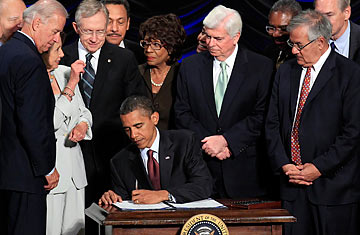
President Barack Obama signs the Dodd-Frank Wall Street Reform and Consumer Protection Act in Washington on July 21, 2010
(2 of 2)
But the final bill does make some strides in those areas. Thanks to Republican Senator Susan Collins — as well as Geithner, who always said capital was the key — there will be higher capital requirements for all big, interconnected firms and holding companies. Regulators will decide how high, but the legislation will help set a floor as the Administration negotiates international standards in Basel, Switzerland. And thanks to Democratic Congressman Paul Kanjorski — as well as Obama adviser Paul Volcker, who belatedly persuaded the White House to endorse size limits — regulators will also be able to break up oversize and potentially risky firms. That's not as good as absolute limits — will regulators ever pull the trigger before it's too late? — but it's something, and the new capital rules will also impose costs on size. Finally, thanks to Democratic Senator Al Franken, there will be a few modest reforms of the ratings agencies, including a study of new ways to prevent investment banks from shopping for better ratings for their bonds. It's just a study, and I still think the entire rating system ought to be junked, but again, it's something.
Some critics have said the bill won't go far enough because it won't abolish naked credit-default swaps, eliminate all proprietary trading by banks or allow Congress to audit Fed monetary-policy decisions. Those all seem like solutions in search of a problem to me. I do think it's a shame that a tax on big banks was scrapped to secure Republican Senator Scott Brown's vote — the concession wouldn't have been necessary if Senator Russell Feingold had dismounted his high horse and broken a filibuster — but no bill is perfect. Sure, it's annoying that auto dealers will be exempt from the new consumer protections, but that just reflects the annoying power of auto dealers. This is still a big step forward.
So why didn't I see it coming? The short explanation is that I was a bit too cynical about Washington.
I expected Republicans who had marched in lockstep against health care to keep marching to deny Obama another huge accomplishment. In the end, three stepped out of line. I was also skeptical that finance-friendly Senate Democrats would resist Wall Street's full-court lobbying press when a bill this complex provided so many potential excuses to break ranks. In the end, only Feingold voted no. And I figured that if the vote were close, Cornhusker Kickback–style deals would end up souring the public on the process. But while Brown did get a few goodies for Massachusetts banks, most of the bill actually improved behind closed doors.
Well, I didn't see that coming. And neither did the Democrats. Last winter, aides to Dodd as well as Obama were determined to avoid an eke-out-60 scenario; their hope was that once the public got engaged, Republicans would be so afraid of looking like Wall Street stooges that they would cut a deal to get the issue out of the news. I thought that was crazy; when I interviewed Senator Robert Corker of Tennessee, the ostensible Republican deal cutter, he told me Obama's proposals made him wonder if he was living in Venezuela. As it turned out, Obama didn't need Corker. The three remaining GOP moderates (Brown, Collins and her fellow Maine Senator Olympia Snowe) were — barely — enough to eke out 60. And the Democrats were clearly afraid of looking like Wall Street stooges.
The lesson — aside from, Listen to your sources! — is that good policies can make it through the sausage factory when they are also popular policies. But in this hyper-partisan era, it's not a given. You'd think the worst financial disaster in 80 years would make stricter financial rules a bipartisan no-brainer. Unfortunately, there's no such thing as a bipartisan no-brainer anymore. And I think that's worth keeping in mind as Congress responds to the worst environmental disaster ever.
But hey, I've been wrong before.
